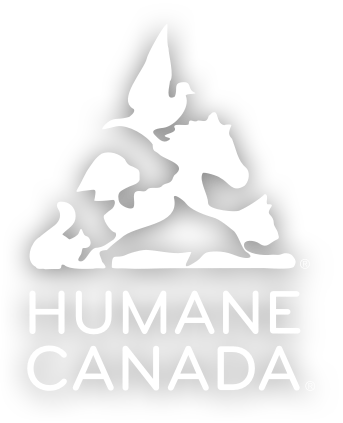
Make a gift from the heart today. Your support is a lifeline for animals in need.
Farming practices in Canada have changed dramatically over the last 50 to 60 years. The number of small family farms has significantly declined, and larger intensive factory farms have become the norm for food production in the 21st century. Facilities that increased mechanization and confinement were introduced to reduce labour costs and address some animal health issues. Unfortunately, these housing systems resulted in new animal welfare issues, including the restriction of the natural behaviours of animals due to confinement and overcrowding.
Every year, more than 800 million animals are slaughtered for food in Canada, most of them chickens. The majority of Canadians assume that the government ensures the humane treatment of farm animals and are shocked to discover the lack of farm monitoring across the country. Canada has no regulations stipulating how animals should be treated on farms outside of federal and provincial animal cruelty laws, and these are only used to prosecute livestock farmers in cases of egregious abuse, such as when animals are neglected to the point of starvation or farm workers are caught torturing animals.
Once animals leave the farm, the conditions are no better. Current transportation regulations generally allow animals to be transported for up to 36 hours without food, water or rest, and trucks are poorly equipped to protect the animals from extreme heat or cold and do little to otherwise protect them from the elements.
Slaughter is another area of concern. Animals may be handled roughly as they are led to slaughter, causing significant stress and fear, as well as injuries. Some animals are improperly “stunned” (i.e.: not fully rendered unconscious) before they are killed, resulting in them being killed while conscious – causing them tremendous pain and suffering.
For both the transportation and slaughter of animals, Canada’s regulations are weak, but just as serious is the lack of enforcement of the existing regulations. News reports in recent years have revealed shocking deficiencies in enforcement of animal welfare and even food safety regulations. It is clear that funding to the Canadian Food Inspection Agency for animal welfare enforcement must be substantially increased to ensure federal regulations are being enforced consistently and effectively.
Farming, transport and slaughter practices in Canada have fallen further and further behind other jurisdictions, such as Australia, New Zealand and the European Union, where public demand for progressive policies and legislation for farm animal welfare has pushed these governments to implement progressive change for animals.
The federal government is now funding the development of new Codes of Practice for the Care and Handling of Farm Animals, which allows us to make improvements to animal welfare with direct buy-in from the farming industry. Coordinated by the National Farm Animal Care Council (NFACC), these codes can serve as reference documents for provincial animal cruelty laws when enforcement is assessing exemptions based on standards of care.
Humane Canada sits on code development committees, advocating for science-based improvements to animal welfare practices on farms across Canada.
Make a gift from the heart today. Your support is a lifeline for animals in need.


